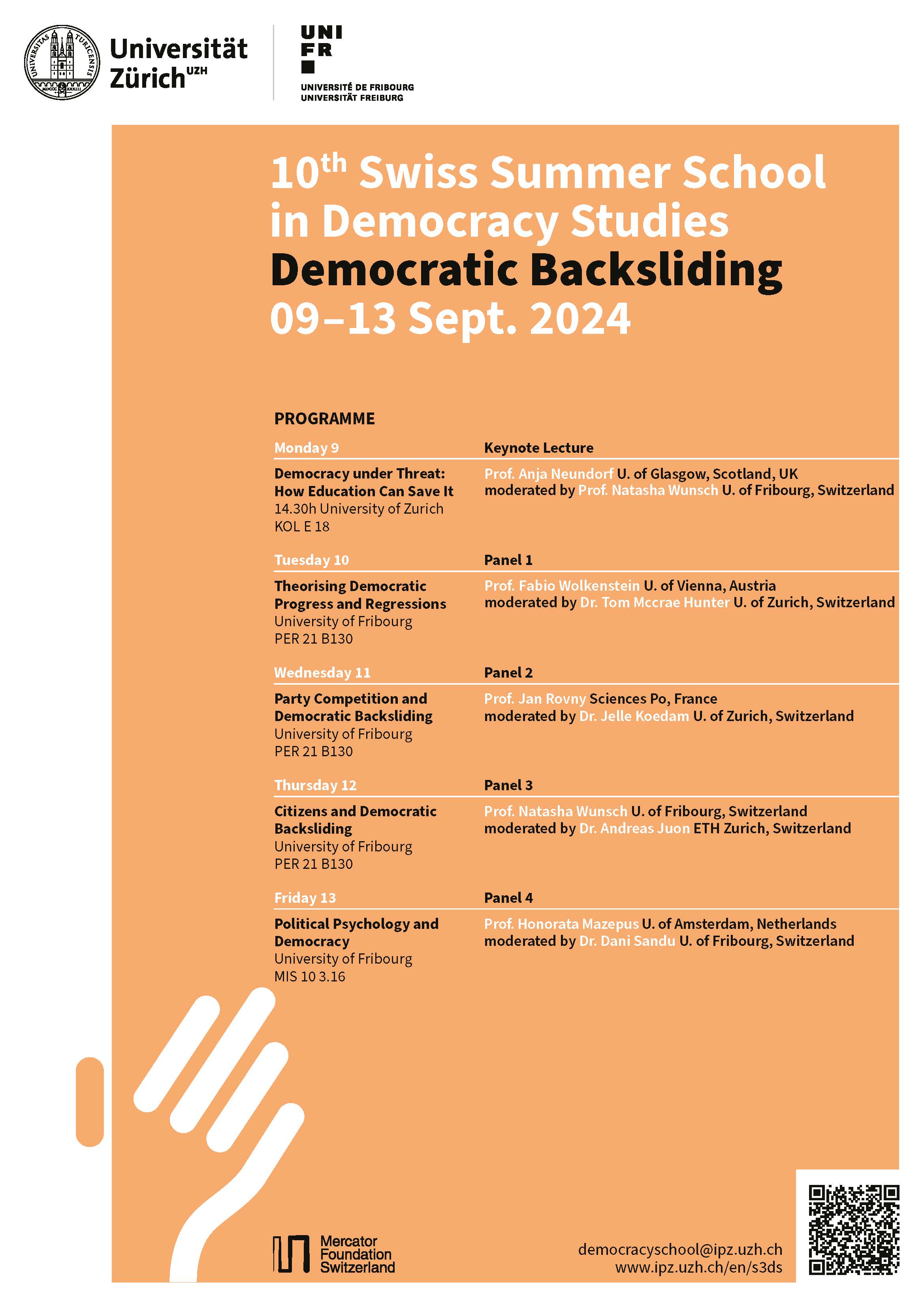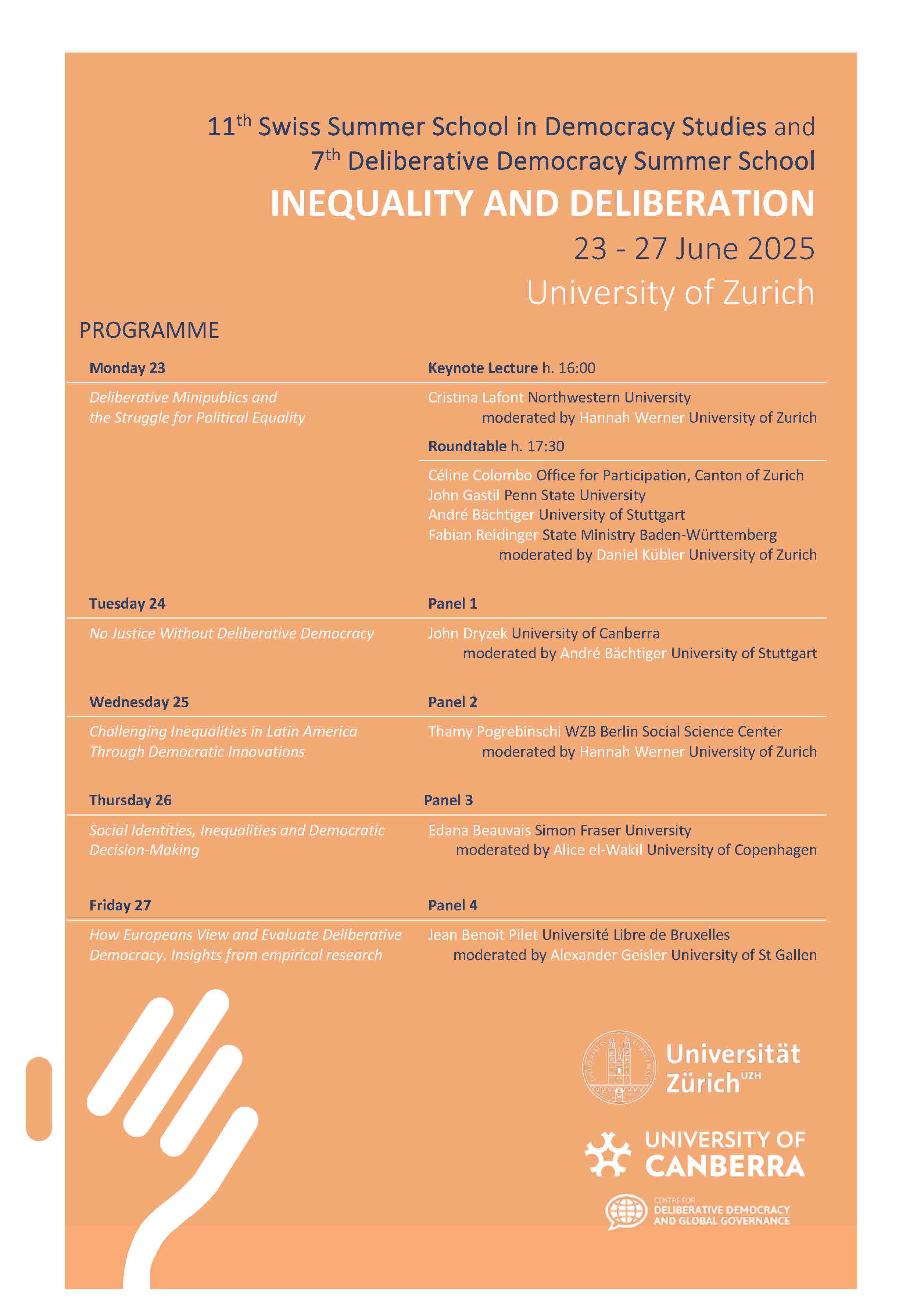Voting advice applications: Methodological development and impact assessment Stefaan Walgrave University of Antwerp, Netherlands, Diego Garzia
Past Swiss Summer Schools in Democracy Studies
PAST EDITIONS
Inequality and Deliberation 2025 Zurich
Democratic Backsliding 2024 Fribourg

Democracy and Peace 2023 Zurich
In light of the war in Ukraine, during the 9th Swiss Summer School in Democracy Studies, participants were exposed to theories and approaches on the relationship between DEMOCRACY and PEACE: democratic peace theories, promotion and defence of democracy, and building democracy in post-conflict societies. The focus was on Ukraine, but not exclusively.
|
Monday 11 |
with Jeffrey Checkel |
|
Tuesday 12 |
with Livia Schubiger |
|
Wednesday 13 |
with Paulina Pospieszna |
|
Thursday 14 |
with Belén Gonzalez |
|
Friday 15
|
with Yuliya Bidenko with |
Advances in Comparative Democracy Research 2022 Zurich
The 8th Swiss Summer School in Democracy Studies took place at the University of Zurich from 12 to 16 September 2022 and focused on recent theoretical and methodological advances in the comparative study of democracy, including political institutions, democratic representation, election campaigns, gender and politics, and social media as a novel source to study democratic politics.
Democratic Election Campaigns: Challanges and Opportunities
Laura Sudulich, U. of Essex
with Frederico Ferreira da Silva, U. of Lausanne
Social Media, Political Science and the Study of Democracy
Andrea De Angelis, U. of Zurich
with Luca Manucci, U. of Lisboa
Diversity in Democracies: Social Groups, Political Behaviour and Representation
Daniel Bochsler, Central European University and University of Belgrad
with Samuel D. Schmid, U. of Lucerne
Gender and Democratic Politics: Are Really Women Who Shy Away from Politics?
Marta Fraile, Instituto de Políticas y Bienes Públicos
with Mathilde van Ditmars, U. of Lucerne
Frontiers of Democratic Innovations 2021 Zurich
The 7th Swiss Summer School in Democracy in Studies on the topic Frontiers of Democratic Innovations took place on Zoom with one session a day from June 15 to July 1, 2021. Democratic innovations, i.e. institutions and practices that increase and deepen citizen participation in political decision-making, are proliferating across the world. Examples include mini-publics, e-democracy and digital participation, direct democracy, or participatory budgeting.
PANEL 1
Innovations in Direct Democracy
Prof. Maija Setälä with Prof. Thomas Widmer
PANEL 2
Participation and Development
Prof. Brian Wampler with Dr. Simon Bornschier
PANEL 3
Democracy in Digital Public Sphere
Prof. Ulrike Klinger with Prof. Frank Esser
PANEL 4
Deliberation and Democracy
Prof. André Bächtiger with Prof. Marco Steenbergen
PANEL 5
Participatory Budgeting
Prof. Baogang He with Prof. Daniel Kübler
Politics and democracy in the digital age 2019 Lucerne
The Summer School on Politics and democracy in the digital age comprises an intensive program of lectures, seminars and young scholars' presentations. Five teaching days are scheduled, each of which focusses on a particular theme related to the overall topic of the Summer School
uzh-wcms-publications.subpageListDialog.labelUnterseiten
-
-
Political polarization in the digital age
Pablo Barberá London School of Economics, UK, Denise Traber University of Lucerne, Switzerland -
Computational Social Science advances in research on democratic actors and processes
Luigi Curini University of Milan, Italy, Alexander Trechsel University of Lucerne, Switzerland -
Digitalization and democratic theory
Thorsten Thiel Weizenbaum Institute for the Networked Society, Berlin Social Science Center, Germany, Joachim Blatter University of Lucerne, Switzerland
Populism 2018 Zurich
Populism was the topic of the 5th Swiss Summer School of Democracy Studies which was held at the University of Zurich from 11 to 15 June 2018. The Summer School focussed on populism from a multidisciplinary perspective and addressed both, individual attitudes on which populist support is based and socio-economic, cultural and institutional conditions making its success more or less likely in a comparative and historical perspective.
The program was composed of lectures and seminars held by leading international experts and workshops in which young scholars presented and discussed their research with the experts. Five one-day sessions focussed on a particular theme related to the wider topic of Populism:
- Populist Democracy (Simone Chambers, U of California, Irvine, USA / Francis Cheneval, U of Zurich)
- Populist Cultures (David Art, Tufts U, USA / Daniele Caramani, U of Zurich)
- Populist Communication (Agnieszka Stepinska, UAM Poznan, Poland / Regula Hänggli, Caroline Dalmus, U of Fribourg)
- Popuist Media (Michael Hameleers, U of Amsterdam, Netherlands / Frank Esser, U of Zurich)
- Populist Attitudes (Andrej Zaslove, Agnes Akkerman, Radboud U, Nijmegen, Netherlands / Marco Steenbergen, U of Zurich)
Democratization in a globalized and mediatized world 2017 St. Gallen
The 4th Swiss Summer School Democracy Studies which focussed on chances and risks for democracy and democratization in an increasingly interconnected world, took place in June 2017 at the University of St. Gallen. It introduced the participants to a wide repertoire of concepts, theories, and methodological strategies in one of the thorniest territories in social sciences – how political systems become, and remain, democratically governed, and how democratic institutions become, and remain, socially embedded.
A mixture of lectures, mini group-work and intensive discussions of the participants' dissertation projects characterized the 2017 Summer School. The program involved five one-day sessions which focussed on a particular theme related to the wider topic of Democratization:
- Global democratic governance (Hayley Stevenson, U of Sheffield / Klaus Dingwerth, U of St. Gallen)
- Democratic diffusion (Jos Elkink, U College Dublin / Oliver Westerwinter, U of St. Gallen)
- Social movements in complex media ecologies (Alexa Robertson, U of Stockholm / Yanina Welp, U of St. Gallen)
- Democratic socialization and attitude change (Christian Welzel, Leuphana U Lüneburg / Tina Freyburg, U of St. Gallen)
- Development assistance and natural resource revenues (Simone Dietrich, U of Essex / Roland Hodler, U of St. Gallen)
Representation and Governance 2016 Zurich
The 3rd Swiss Summer School Democracy Studies took place in June 2016 at the Swiss Federal Institute of Technology in Zurich (ETHZ) and raised the issue of challenges to political representation in a globalizing world. Given that parliaments are widely considered the biggest losers in the shift of authority to international organizations, the Summer School provided theoretical and empirical insights into how societies, parties, and parliaments have responded to this challenge.
A mixture of lectures and intensive exchange between PhD students and established scholars characterized the 2016 Summer School. It gave PhD students a unique opportunity to discuss their research projects in small groups and with well-known experts from their field. The program involved five one-day sessions which focused on a particular theme related to the wider topic of Representation and Governance:
- Concept and Theories of Political Representation (Suzanne Dovi, U of Arizona / Francis Cheneval, U of Zurich)
- Technocracy, Populism and Stealth Democracy (Stefaan Walgrave, U of Antwerp / Daniele Caramani, U of Zurich)
- Civil Society in Global Governance (Jonas Tallberg, U of Stockholm / Vally Koubi, ETHZ)
- National Parliaments: Reactions to Deparliamentarization (Berthold Rittberger, LMU Munich / Thomas Winzen, ETHZ)
- Reconstructing Representation in Global Governance (Mathias Koenig-Archibugi, LSE / Frank Schimmelfennig, ETHZ)
Democratic Innovations 2015 Zurich
The 2nd Swiss Summer School Democracy Studies took place in June 2015 at the University of Zurich and raised the issue how established democracies can be re-invigorated and renewed. It provided theoretical and empirical insights into how established democracies adapt to new challenges and transform in that process.
A mixture of lectures and intensive exchange between PhD students and established scholars characterized the 2015 Summer School. It gave PhD students a unique opportunity to discuss their research projects in small groups and with well-known experts from their field. The program involved five one-day sessions which focused on a particular theme related to the wider topic of Democratic Innovations:
- New Forms of Citizen Participation in Established Democracies (Brian Wampler, Boise State U, USA / Daniel Kübler, U of Zurich)
- Deliberative Democracy (Michael Neblo, Ohio State U, USA / Marco Steenbergen, U of Zurich)
- Social Media and Democracy (Homero Gil de Zuniga, Vienna, Austria / Frank Esser, U of Zurich)
- Political Consumerism: A New Form of Political Behavior? (Dietlind Stolle, McGill U Montreal, Canada / Birte Gundelach, U of Zurich)
- E-Democracy: Digital Channels of Participation (Eva Anduiza, UA Barcelona, Spain / Uwe Serdült, U of Zurich)
Democracy and Globalization 2014 Lucerne
The 1st Swiss Summer School Democracy Studies took place in June 2014 at the University of Lucerne. It focussed on Democracy and Globalizationwhich is of great importance in research and society since globalization creates both challenges and opportunities for democracy today.
Analytical and normative concepts for tracing and evaluating processes of (de-)democratization in the national, supranational and transnational realm were addressed in four two-day workshops which were structured in lectures with international keynote speakers, and PhD project presentations and discussions chaired by two experts:
- Democratic Inclusion in a Transnationalizing World (Robert Goodin, ANU, Australia / Joachim Blatter, U of Lucerne)
- Varieties of Democracy Beyond the State (Michael Zürn, WZB, Germany / Sandra Lavenex, U of Lucerne)
- Democratization and its Enemies (Philippe Schmitter, EUI, Italy / Daniel Bochsler + Saskia Ruth, U of Zurich)
- Democratic Deliberation and Negotiation (Jane Mansbridge, Harvard U, USA / André Bächtiger, U of Lucerne)

